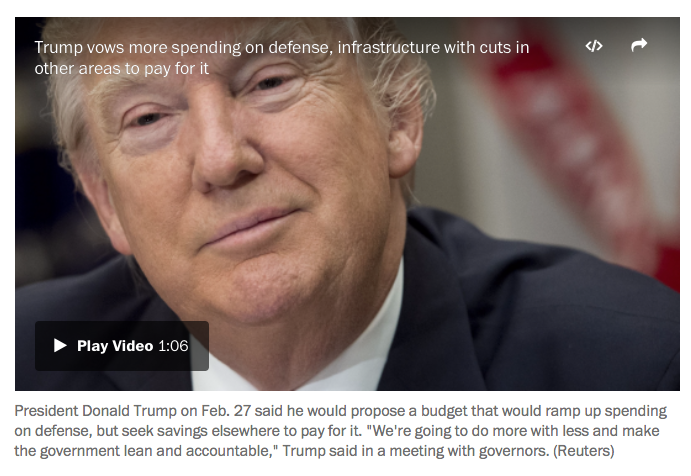President Trump will propose a federal budget that dramatically increases defense-related spending by $54 billion while cutting other federal agencies by the same amount, according to an administration official.
CLICK IMAGES for links to videos. CLICK HERE for direct link to story.
The proposal represents a massive increase in federal spending related to national security, while other priorities, especially foreign aid, will see significant reductions.
According to the White House, the defense budget will increase by 10 percent. But without providing any specifics, the administration said that most other discretionary spending programs will be slashed to pay for it. Officials singled out foreign aid, one of the smallest parts of the federal budget, saying it would see “large reductions” in spending.
[Budget breakdown: What the White House wants to spend money on]
It is the first indication of spending priorities by the new administration, with the president set to arrive on Capitol Hill on Tuesday night for a joint-session speech to Congress. But the full budget negotiations between Trump and Congress will not be complete for many months. 
In a statement at the White House on Monday morning, Trump said that his budget would put “America first” by focusing on defense, law enforcement and veterans using money previously spent abroad.
“We are going to do more with less and make the government lean and accountable to the people,” Trump said. “We can do so much more with the money we spend.”
[Analysis: The U.S. foreign-aid budget, visualized]
The White House did not specify how Trump’s budget would address mandatory spending or taxes, promising that those details would come later. The main drivers of government spending are entitlement programs, such as Medicare and Social Security, and Trump has promised not to touch those programs. The administration is also planning to slash taxes, which would probably further add to the debt.
Defense spending accounts for almost the same proportion of the federal budget as all non-discretionary domestic spending, meaning that the Trump administration’s proposal will result in a roughly 10 percent across-the-board cut in all other federal spending programs.
Most federal agencies would see substantial reductions in their budgets, said the Office of Management and Budget administration official, who spoke on the condition of anonymity on a call with reporters to discuss the proposal.
The announcement marks the beginning of a process in which the OMB will coordinate with individual agencies to flesh out the plan.
Trump said that budget, which will be submitted to Congress next month, would propose “historic” increases in spending to bolster the country’s “depleted military,” and he said it would also support law enforcement in an effort to reduce crime.
[Trump team plans for infrastructure ‘task force’ to advance top spending priority]
He also noted that the country faces an urgent infrastructure problem, that he promised in the presidential campaign to address with a $1 trillion infrastructure spending plan. While the administration has not yet outlined whether infrastructure will be part of Trump’s budget proposal, the president spoke about it at length before a gathering of governors at the White House on Monday.
“We’re going to make it easier for states to invest in infrastructure,” Trump said. “We spent $6 trillion in the Middle East, and we have potholes all over our highways and our roads.”
“Infrastructure, we’re going to start spending on infrastructure — big,” he added.
Republicans in Congress expect that the details released this week will be the first elements of a broader budget that will be rolled out next month. The Trump administration is expected to release a pared-down “skinny budget” the week of March 13 and a fuller list of budget requests by the end of March or early April, according to multiple congressional Republican aides who spoke on the condition of anonymity to discuss a process that is just starting.
Individual agencies are expected to begin the customary process of sending budget requests for the upcoming fiscal year to the White House beginning midday on Monday, the aides said. The OMB — headed by former House lawmaker Mick Mulvaney (R-S.C.), who was a spending hawk in Congress — will then begin drafting an official request for fiscal 2018 and submit it to Congress in the coming weeks.
Congress typically does not agree with the White House budget in full, even when the president and congressional leaders represent the same party. Republican leaders have not yet said when they will release their budget blueprint for the fiscal year that starts Oct. 1.
House Speaker Paul D. Ryan (R-Wis.) told members at a GOP retreat in Philadelphia in January that he expects to act by July on a 2018 budget proposal that will lay out major spending cuts and kick-start the process of rewriting the tax code.
Philip Rucker and Ana Swanson contributed to this report.



You must be logged in to post a comment Login